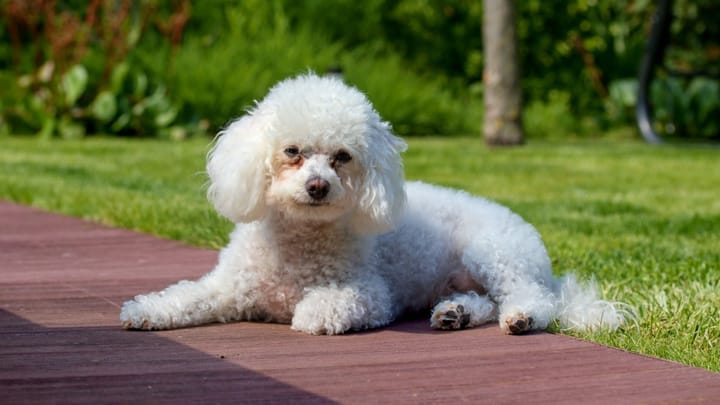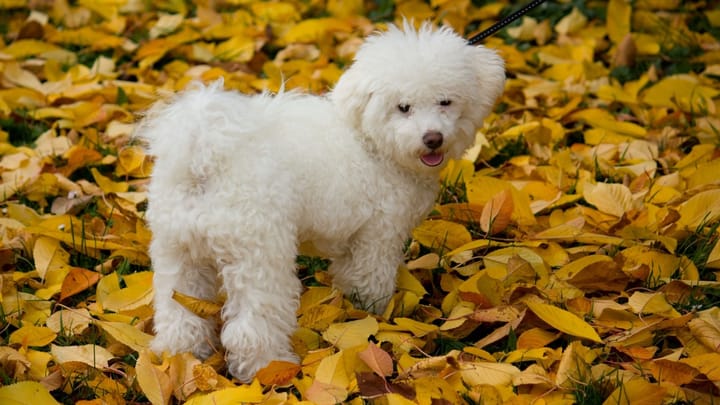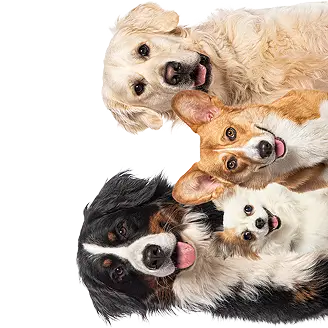Bolognese
Other names : Bichon Bolognese, Bolognese Toy Dog


The Bolognese Bichon is a small companion dog with a big personality. These dogs love lots of attention and cuddles and thrive off the company of their favourite humans and other dogs. They form really strong bonds with their owners and are a perfect choice for people looking for a smaller breed with less demanding exercise requirements. These cute toy dogs have a relatively long lifespan but retain much of their youthful vigour well into old age.
|
Life expectancy |
The Bolognese has a life expectancy of between 12 and 14 years |
|
Temperament |
|
|
Size |
Small
|
|
Adult size |
Female
Between 10 and 31 in
Male
Between 11 and 12 in
|
|
Adult weight |
Female
Between 4 and 9 lb
Male
Between 4 and 9 lb
|
|
Coat colour
Pure brilliant white with no other colouring or markings. |
White |
|
Type of coat
Bolognese Bichons have long, curly coats. Single layered coat with long curls and a woolly texture; requires regular grooming to prevent matting. |
Long |
|
Eye colour
Always dark brown or black. |
Brown
|
|
Purchase price |
The Bolognese costs between £935 and £1070 |
Although they're a fairly obedient bred, it's important that you know when you to say “no” to your Bichon. Giving in to their every whim and desire, especially during their formative years, will create a very stubborn and demanding little dog; such behaviours can be very hard to "untrain."
Bichons are social animals, but they can get quite nervous around new people. Whatever you do, don't force them into situations if they seem uncomfortable. Just let them do their own thing. They'll come and say hello when they're ready.
More details about the Bolognese
Bolognese: Origins and history
These dogs are members of the Bichon family, which includes the Bichon Frise, the Maltese, and the Havanese. Despite their similarities to some of their close cousins, the Bolognese Bichon is a breed in its own right. Given its name, its roots are likely to begin in Bologna, a city in northern Italy. They have a noble history, being the dog of choice for many 17th century aristocratic families. They also appear in paintings by several of the worlds greatest ever painters, including Titian and Goya. The breed was introduced to UK dog lovers in the 1990s and made its first Crufts appearance in 2002.
Physical characteristics of the Bolognese
The Bolognese Bichon is a small, compact dog with a very distinct white coat. It has a square, stocky body with a deep chest and a slightly rounded head. Bolognese Bichons have dark noses, dark eyes, and a relatively long muzzle compared to its diminutive stature. It has high set ears and a long, curly tail.
FCI classification of the Bolognese
-
Group 9 - Companion and Toy Dogs
-
Section 1 : Bichons and related breeds
Bolognese: Characteristics
Bolognese: Behaviour
Training a Bolognese
These dogs respond well to training, although they will soon grow bored if the sessions are too long, too repetitive, or too complex. Focus on short, fun training sessions and stick to basic dog obedience commands. Anything more than that will probably be beyond the dog's capabilities, and they'll soon lose focus.
Bolognese: Lifestyle
Breed compatibility Bolognese
Bolognese: Purchase price
The average cost of a purebred Bolognese Bichon is somewhere between £935 if they are not registered at the Kennel Club and £1070 if they are.
You'll also need to budget around £30-40 a month for feeding costs, and the average cost of a basic insurance policy is around £20,00 per month, although this varies from dog to dog. Yearly health checks, vaccinations, and other costs will add to an annual expense of around £900.
Bolognese: Shedding
Light
Bichons are not prone to hair loss and shed very little.
Bolognese: Grooming
Despite their long, fluffy coats, Bolognese Bichons shed very little. This will save you a lot of time and money (regular trips to the doggy salon can hit your wallet hard!) However, they will need a weekly brush. Without it, their curly coats will soon become matted. Not only is this really uncomfortable, but it's also a health risk. A matted coat traps in dirt and grime, which can lead to skin infections and other health complications.
Bolognese: Health
The average lifespan for a Bolognese Bichon is between 12-14 years.
Despite their small frames, these dogs are still pretty sturdy, making them a lot tougher than they look. Still, it's best to handle them gently and try to avoid exercising them in rural environments. These guys were bred to be companion dogs; they lack many of the characteristics needed to thrive in more physically challenging environments.
Bichons are pretty comfortable in any kind of weather. They have no problems regulating their body temperature and are not prone to overheating or heat exhaustion.
Their thick coats do a good job of keeping them warm during the milder parts of winter, but all toy breeds will start to struggle as the temperatures drop. Owners will need to invest in a high-quality doggy coat.
Bolognese Bichons aren't prone to obesity or weight gain. However, it's really important that you don't overfeed them. Their small frames are not designed to carry large amounts of weight. An overweight Bichon will soon start developing health problems, including arthritis, joint dysplasia, and more serious conditions such as heart disease or even cancer.
- Liver disease
- Hip Dysplasia
- Cataracts
- Weepy eyes
- Patellar luxation
- Allergies






